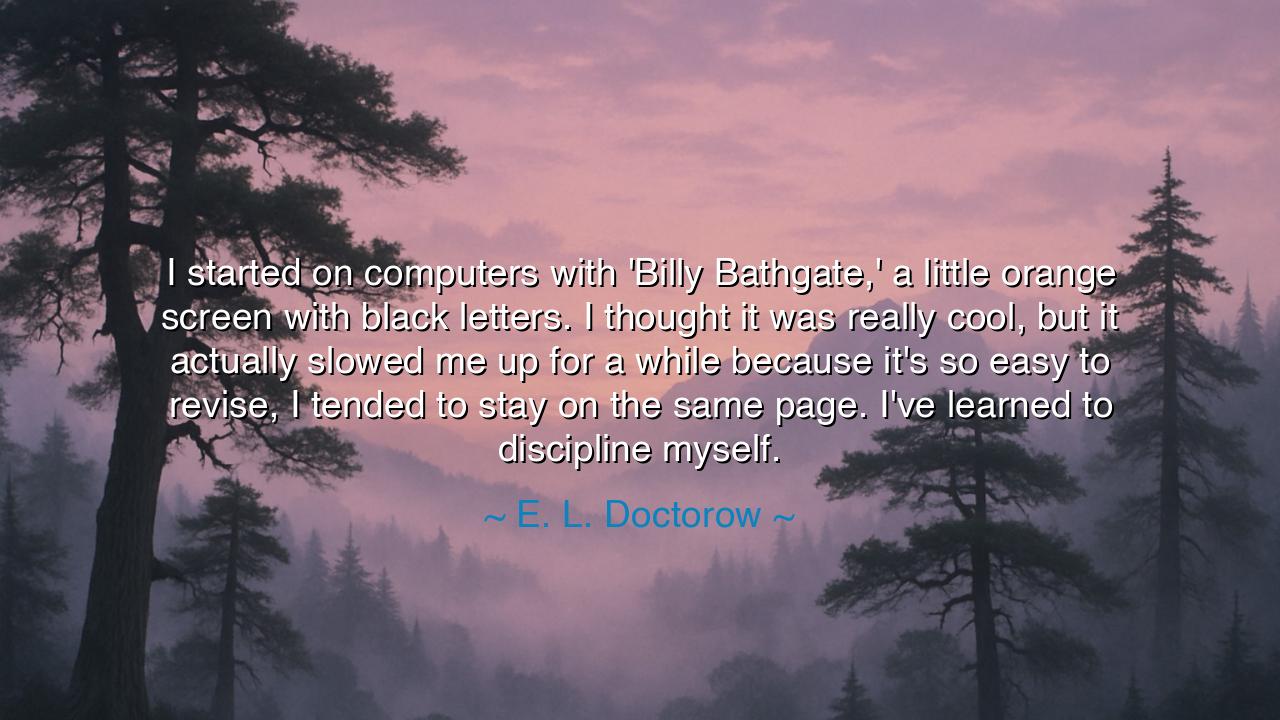
I started on computers with 'Billy Bathgate,' a little orange
I started on computers with 'Billy Bathgate,' a little orange screen with black letters. I thought it was really cool, but it actually slowed me up for a while because it's so easy to revise, I tended to stay on the same page. I've learned to discipline myself.






“I started on computers with ‘Billy Bathgate,’ a little orange screen with black letters. I thought it was really cool, but it actually slowed me up for a while because it's so easy to revise, I tended to stay on the same page. I've learned to discipline myself.” — E. L. Doctorow
Hear the voice of E. L. Doctorow, the master storyteller who bridged the worlds of ink and electricity. In this reflection, he speaks not merely of the machine, but of discipline, of the eternal struggle between creation and correction. His words are a parable for all who labor in the arts, who wield tools of immense power and yet find themselves trapped by their very convenience. For in his confession, we see a truth both ancient and modern: that progress, without restraint, can lead to stagnation; that the tools which promise speed and perfection may instead ensnare the soul in endless revision.
When Doctorow began work on “Billy Bathgate,” the age of digital writing had just begun. The computer, with its glowing screen and infinite capacity for change, seemed a wonder—a gift from the future. Yet he soon discovered its hidden danger. In the days of the typewriter, every word struck was a small commitment; to alter it required labor, intent, and courage. But now, with a few keystrokes, the past could be erased. The ease of revision became a temptation—to polish endlessly, to hover over one paragraph until the pulse of the story slowed to stillness. Thus, the writer, who once moved forward like a river, found himself circling a single eddy, caught in the whirlpool of perfectionism.
This is no new trial, though the tool has changed. The ancients, too, faced their own snares of abundance. In the library of Alexandria, scholars drowned in the sheer volume of knowledge, their pursuit of completeness often stifling the act of creation. The Roman orator Cicero warned that “endless correction is the enemy of eloquence,” for even the sharpest quill can dull when pressed too long to the page. Doctorow, in his time, rediscovered this wisdom through the hum of the machine. His orange letters glowed with promise—but they also mirrored the fire of distraction, the seductive light that blinds as much as it illuminates.
In realizing this, Doctorow learned discipline—the oldest and truest companion of the artist. He understood that the act of creation demands motion, not paralysis; faith, not fear. The page, he saw, must not be worshiped, but conquered. Each draft must live and die so that the work may breathe. This was his awakening: that the writer’s duty is not to craft perfection in every line, but to press forward, trusting that clarity and beauty will emerge through persistence, not endless refinement.
Consider the sculptor Michelangelo, who said that every block of marble already contained the figure within—it was only his task to set it free. Had he lingered on every strike, doubting each chip of the chisel, the stone would have remained forever mute. So it is with writing, and indeed with all creation. The computer, like the chisel, is but a servant; the hand that guides it must know when to act, when to pause, and when to let go. To discipline oneself, as Doctorow did, is to reclaim mastery over the tool—to bend it toward purpose, rather than be bent by its seduction.
His words carry a broader message beyond the writer’s desk. In every craft and every life, there lies the same temptation—to refine endlessly, to hesitate until the moment passes. The world of technology, rich with options and revisions, invites us to dwell forever in the realm of possibility, never reaching completion. But wisdom demands closure, the courage to finish what is begun, to move forward even when uncertainty whispers. For only by finishing can one begin again—and only through discipline does one find true freedom.
So, children of the digital dawn, take heed of Doctorow’s lesson. The ease of the tool must never lull you into idleness. Use your machines as you would a sword: with precision, but also with restraint. Write boldly, live fully, and revise not endlessly, but wisely. For the greatest art—and the greatest life—arises not from perfection, but from momentum. Remember: every page must turn, every song must end, and every creation must be released into the world. Discipline is the bridge between vision and reality, and through it, the human spirit remains master of its inventions.






AAdministratorAdministrator
Welcome, honored guests. Please leave a comment, we will respond soon